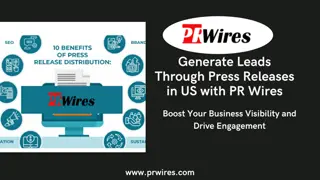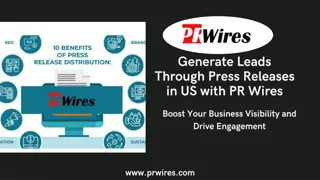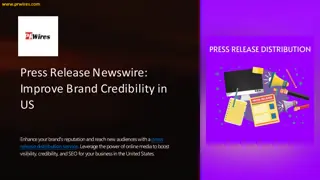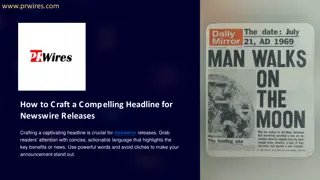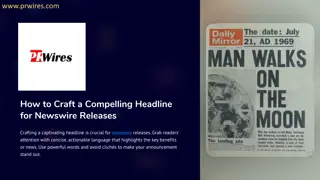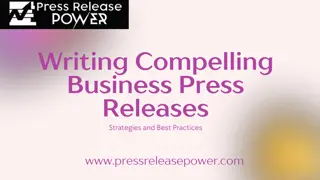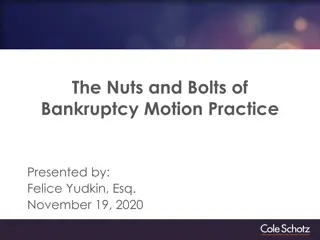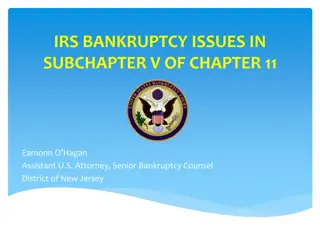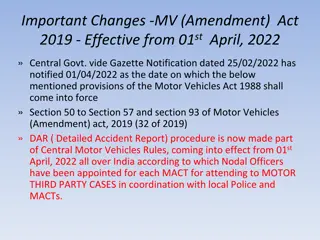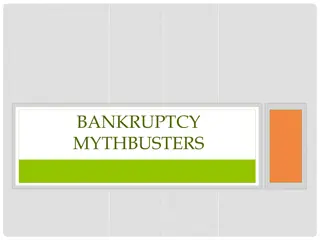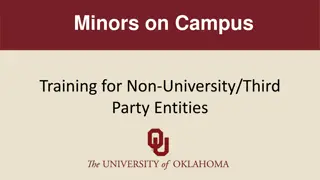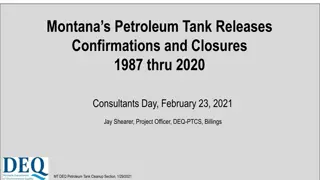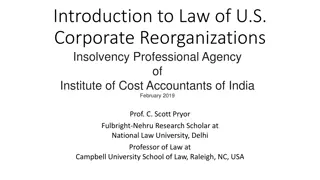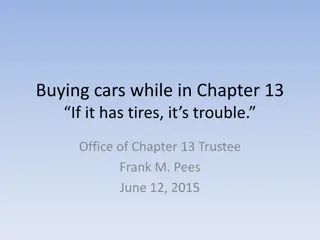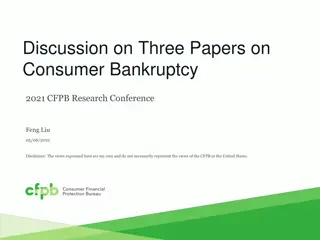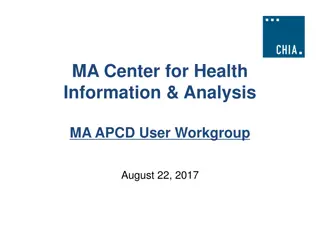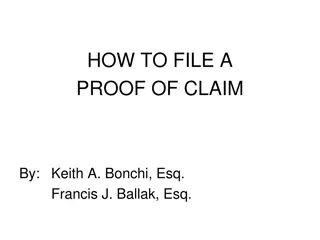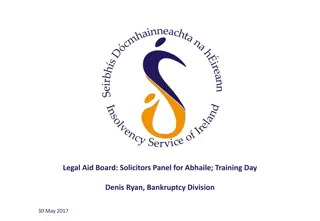Understanding Third-Party Releases in Chapter 11 Bankruptcy Plans
Chapter 11 bankruptcy plans often include provisions for third-party releases, releasing non-debtor entities from claims held by creditors. These releases can impact various stakeholders, from insiders to affiliates, and involve consent through opt-out mechanisms. In the Third Circuit, such releases are evaluated based on contract law principles. Failure to opt-out can result in creditors being bound by the releases, necessitating a careful review of proposed plans to protect their rights.
Download Presentation

Please find below an Image/Link to download the presentation.
The content on the website is provided AS IS for your information and personal use only. It may not be sold, licensed, or shared on other websites without obtaining consent from the author. Download presentation by click this link. If you encounter any issues during the download, it is possible that the publisher has removed the file from their server.
E N D
Presentation Transcript
Chapter 11 Plan Third-Party Releases: An Overview July 15, 2024 Presented by: John P. Schneider, Esq. John P. Schneider, Esq. Bankruptcy and Restructuring Department Associate jschneider@lowenstein.com (646) 414-6843
Third-Party Releases Generally Confirmation of a Chapter 11 plan of reorganization does not discharge claims against non-debtor entities Upon confirmation of a reorganization plan in a chapter 11 case, the debts of the bankrupt entity are discharged pursuant to section 1141(d) of the Bankruptcy Code. Section 524(e) of the Bankruptcy Code specifically provides that the discharge does not affect the pre-confirmation liability of non-debtor entities. However, debtors have sought to expand the scope of the discharge to include the release of claims against third-party non-debtor entities including insiders and affiliates of the debtor. Chapter 11 plans often propose to release non-debtors from direct claims held by creditors or other third-party stakeholders. Commonly referred to as third-party or non-debtor releases, these provisions often release and/or enjoin claims (present or future, known or unknown) against the debtor s principals, officers, directors, affiliates, guarantors, insurers, lenders, and other stakeholders when those parties could assert post-confirmation indemnification claims against the debtor, or the non-debtor party is a potential source of funding for the plan of reorganization. 2
Consensual Third-Party Releases within the 3rd Circuit Consensual Third-Party Releases are a matter of contract law In the Third Circuit, where releasing parties have consented to a provision in a plan of reorganization that releases claims against non-debtors, such releases will be approved on the basis of general principles of contract law. See First Fid. Bank v. McAteer, 985 F.2d 114, 118 (3d Cir. 1993) (noting that a consensual third-party release is no different from any other settlement or contract and does not implicate section 524(e)). 3
Opt-Out of the Third-Party Release or Forever Hold your Peace Creditors or interest holders can be deemed to consent to a third-party release contained in a Chapter 11 plan when they fail to opt out of the release. Under an opt-out provision, a creditor or interest holder must affirmatively abstain from voting in favor of a Chapter 11 plan and/or provide documentation to the debtor stating that they do not consent to the third-release by checking a box on the voting ballot. Under these circumstances, a creditor or interest holder who fails to opt out agrees to any third-party release provided for in the Chapter 11 plan. This places an affirmative duty on all creditors and affected parties to analyze a proposed Chapter 11 plan and opt out in order to protect their rights. Opt-out releases have been approved numerous times by Bankruptcy Courts within the District of New Jersey. o See, e.g. In re Congoleum Corporation, Case No. 20-18488 (MBK) (Bankr. D.N.J. Jan. 11, 2021) [Docket No. 642] (approving use of opt out election form as means of obtaining consensual third party releases); In re Modell s Sporting Goods, Inc., Case No. 20-14179 (VFP) (Bankr. D.N.J. Nov. 13, 2020) [Docket No. 827] (same); In re Aceto Corporation, et al., Case No. 19-13448 (VFP) (Sept. 18, 2019) (approving releases by parties who abstain from voting on the plan, abstain from electing on their ballot to opt-out and all holders of claims that vote to reject the plan but do not elect on their ballot to opt-out of the third-party release); In re Cinram Grp., Inc., Case No. 17-15258 (VFP) (Bankr. D.N.J. Nov. 30, 2018) [Docket No. 575] (order confirming plan and approving third party releases by creditors who had consented by not opting out of the releases, either by abstaining from voting or by voting on the plan without affirmatively electing to opt out of the releases); In re Saint Michael s Medical Center, Inc., et al., Case No. 15-24999 (VFP) (Jan. 12, 2017) (overruling objection of U.S. Trustee and finding third party release were consensual with opt-out election). 4
Popular Arguments against Approval of Opt-Out Releases Basic contract law principles could render opt-out procedures nonconsensual As noted, bankruptcy courts generally apply contract principles in deciding whether a creditor consents to a third-party release. Under basic contract law principles, consent may be express or manifested by conduct. Parties must objectively manifest their acceptance and intent to be bound by a contract[.] Craddock v. LeClair Ryan, P.C., 2016 WL 1464562, at *8 (E.D. Va. Apr. 12, 2016). However, absent a duty to speak, silence or inaction does not constitute consent. See, e.g., Id. at *6 ( Silence and inaction typically do not constitute acceptance of a contract and its terms. ); In re Teligent, Inc., 282 B.R. 765, 771 (Bankr. S.D.N.Y. 2002) ( . . . an offeror cannot treat silence or inaction as acceptance . . . he cannot ordinarily force the other party into a contract by saying if I do not hear from you by next Tuesday, I shall assume you accept. ) (citations omitted). By the same token, a legal right may be waived only if it is knowingly, voluntarily and intentionally abandoned. Luitpold Pharm., Inc. v. Ed. Geistlich Sohne A.G. Fur Chemische Industrie, 784 F.3d 78, 95 (2d Cir. 2015) (citation omitted) (emphasis added). See also In re Buffalo Coal Co., Inc., 418 B.R. 878, 890 (Bankr. N.D.W. Va. 2009) ( Waiver is the voluntary, intentional abandonment of a known legal right, advantage, or privilege. ) (applying Virginia law). 5
Popular Arguments against Approval of Opt-Out Releases (cont.) Silence is not consent in analogous contexts under the Bankruptcy Code Section 363(f)(2) allows a trustee or debtor-in-possession to sell property of the estate, free and clear of any interest in the property, if the entity holding the interest consents. 11 U.S.C. 363(f)(2). Section 1126(c) provides that a class has accepted a plan if the plan has been accepted by the requisite number and amount of the claims in the class. Courts routinely hold that the failure of a creditor to submit a ballot does not result in acceptance of the plan. See, e.g. In re Vita Corp., 380 B.R. 525 (C.D. Ill. 2008); In re Jim Beck, Inc., 207 B.R. 1010, 1015 (Bankr. W.D. Va. 1997). 6
Nonconsensual Third-Party Releases within the 3rd Circuit The Third Circuit has approved nonconsensual third-party releases In re Millennium Lab Holdings II, LLC, 945 F.3d 126 (3d Cir. 2019), the Third Circuit held that the bankruptcy court had constitutional authority to approve a Chapter 11 plan containing nonconsensual third-party releases. However, the Court limited its decision to the facts before it and emphasized the intensive negotiations between sophisticated parties, the fact that the releases were absolutely required for the reorganization, and that the debtor would have gone into liquidation without the releases. The Court further emphasized that its prior precedents still apply, which require that, in order to be approved, such releases have The hallmarks of . . . fairness, necessity to the reorganization, and specific factual findings to support these conclusions. - Subsequently, in In re Weinstein Company Holdings, LLC, et al., Case No. 18-10601 (Bankr. D. Del. Jan. 26, 2021) [Docket No. 3203], the Bankruptcy Court for the District of Delaware approved nonconsensual third-party releases contained in the debtors Chapter 11 plan of liquidation. In so doing, the bankruptcy court determined that without the releases, there could be no confirmation since the debtors did not have sufficient funds to make the plan s distributions absent contributions by the released non-debtor third-parties. 7













